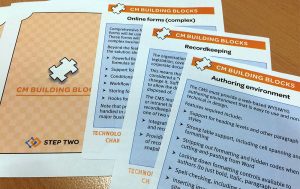Filed under: Content management, Usability
I’ve been facilitating CMS vendor demos for most of this week, as part of the final stages of a University CMS selection project. One of the things that has changed in the products is their support for accessibility, generally for the better.
The good news
There have been some encouraging improvements:
- Some now include built-in “accessibility checkers”, which assess content against a wide range of accessibility issues. Far from perfect, they do at least highlight many common issues.Cutting-and-pasting from Word removes most of the Word “junk code” that impact both web standards and accessibility.
- Accessibility details can be added to images, links and tables. In most cases, this can be enforced.
- A lot of the old-school formatting in the products has been replaced by the use of CSS.
- By default, functionality such as calendars and forms produces reasonably clean HTML.
Still some work to go
Despite the improvements, there are still outstanding issues:
- Having built-in accessibility checkers is nice, but not a lot of use if content produced by the CMS routinely fails its own tests. (This looked very odd during the demos!)
- The checkers also don’t do anywhere near enough to correct (or help to correct) the issues, and can overwhelm the author with detail.
- It’s often not clear exactly when accessibility is enforced. Is it during editing, when the page is checked in, later in the workflow, or before final publishing?
- Vendor understanding of accessibility is still very weak, often no more than “well, we’ve published site x that met level 3, so we must be fine”.
- Cutting-and-pasting from Word is still a source of problems, remarkable considering how important this is for authors.
- Legacy HTML still remains in the products, such as setting the widths of objects in pixels, or picking colours out of Windows-style colour pickers (rather than using CSS).
- Online forms produced by the CMS are particularly poor in terms of accessibility.
- Having the CMS itself being accessible for authors is still a distant pipe dream.
What it means
Expect more from your CMS when it comes from accessibility. If the products you’re assessing don’t offer anything in this area, consider looking at some that do!
Even if some functionality is offered, look under the hood to see what it really means in practice, and take nothing for granted.
Accessibility is an important issue, and it’s good to see that CMS vendors are finally making some substantive progress in this area. Still a long way to go, but hopefully we’re on our way.




